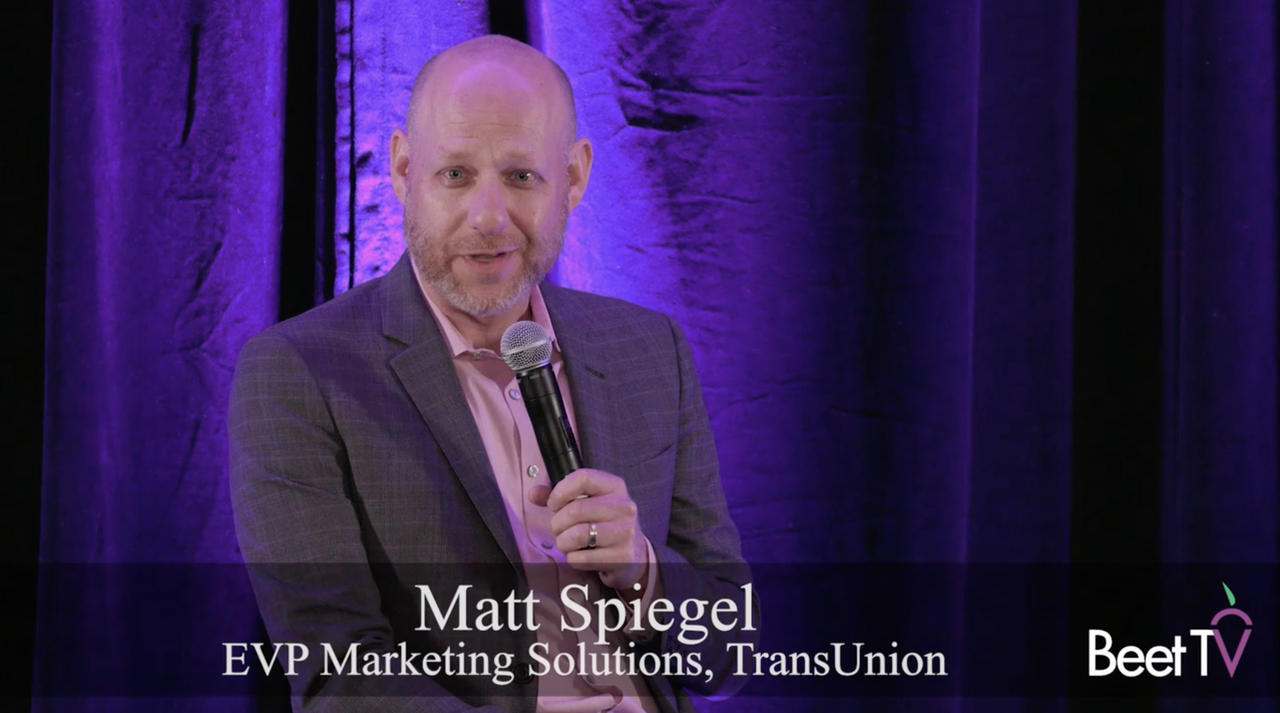TV Can Learn From Programmatic Digital’s Past: TransUnion’s Matt Spiegel

TV Can Learn From Programmatic Digital’s Past: TransUnion’s Matt Spiegel
LOS ANGELES – The television marketplace is being transformed with the growth of streaming services and the promise of addressable advertising on national networks.
Audience targeting will be more granular, helping brands to improve the return on investment (ROI) from their media spending.
“Marketers have clearly voted with their wallets by showing where they put new dollars that when you have identity-underpinned targeting and opportunities, there’s a better ROI,” Matt Spiegel, executive vice president of marketing solutions and head of media vertical at TransUnion, said in this conversation with consultant Zach Rodgers at the Beet Retreat.
Advancements in technology are giving more tools to harness data for ad targeting on a broader range of inventory, rather than remnant time bought at a discount.
“It is the digitization of this industry that allows for this conversation to now apply broadly,” Spiegel said.
“Good news: We’re now having a conversation not as a mechanism to monetize otherwise unvalued inventory.
We’re having a conversation about the fact that precision and addressability leads to better ROI.” Television has the power to deliver advertising with more emotional impact with sight, sound and motion, which is a significant advantage over most digital display ads.
“We’re still seeing some of the same challenges that we were talking about a decade ago,” Spiegel said.
“I was always curious to why we would separate the notion of data being good for one type of investment but not for another, but a decade ago, those capabilities didn’t exist for what was the big-dollar, mass TV ecosystem.” Avoiding Programmatic Mistakes One of the key issues for the evolving market for the video ad market is whether brands will seek to chase audiences wherever they can find them.
This characteristic of the programmatic market had many pitfalls, such the appearance of ads among objectionable content and proliferation of fraudulent websites.
“We have the potential for the same mistakes,” Spiegel said.
“The good news about the TV ecosystem -- certainly from the head of it -- there’s much less concern about fraud.” The development of identifiers that help advertisers to determine whether they’re getting deduplicated reach will make a big difference.
“The reality in the programmatic world of display, we weren’t dealing actually with identity.
It was browser-based cookie sessions,” Spiegel said.
“The fact that we’re talking about real identity changes the game of how this all works.” The future of identity resolution among households, devices and people will become more based on biometric signals.
“It’s only a matter of time before we’re talking about voice as an identity signal that matters,” Spiegel said.
Avoiding the ‘Tech Tax’ Another key concern is that multiple intermediaries in the marketplace will all collect their fees, reducing the amount of ad spending that actually reaches a publisher, broadcaster or other kind of video content provider.
“There is a major risk that what we’re going to do is have a ton of individual tech components all around the same goal, and you’re going to be worried about all the costs that you’re including in the system,” Spiegel said.
“It’s going to be make it really hard for this thing to scale.” ‘Micro-Segmentation at Scale’ The media market can have dynamic ad insertion that’s separate from biddable inventory, Spiegel said, adding, “I do think the TV ecosystem was never headed to a world of high level of biddability.” Marketers can achieve effective targeting on mass media even if they’re not having one-to-one conversations with every individual.
“Practically speaking, we’re not going after one-to-one marketing at scale,” Spiegel said.
“We’re going after micro-segmentation at scale.
That can be effectively done at a household level.
That can be done with clusters that matter.” You are watching coverage from Beet Retreat Santa Monica 2021, presented by FreeWheel, IRIS.TV, Samba TV, TransUnion & Warner Music Group.
For more videos, please visit this page.
